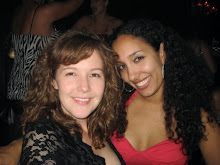Aneya: So Lauren and I both noticed the difference in the way families interact here in Chile compared to the U.S. Obviously Latin culture revolves around the family structure, and the kids are always supposed to take care of the elders. Generations of families live together in one house, and it's extremely uncommon for a young woman to live on her own.
Lauren: Everything is geared toward the family. Ads for public works projects, Coca Cola commercials everything is cast in this "Your family will be better for doing this" light. Coca Cola brings the family together. Cleaning the river? "For the family to enjoy," government ads tell us. I would never let a kid "enjoy" the torrential Mopocho, but that's just me. Ads arn't so much about being cool, but about your family being better for doing something.
Aneya: Although families can be affectionate and loving in the States, it's usually done in private, whereas here, affection is loud and proud, you constantly see children being kissed and hugged and loved by their parents. It's really quite touching to see.
Lauren: All the time. It's really touching. At a busy bus station, at lunch, people are always hugging their spouse and being affectionate with their kids.
Aneya: Younger children here seem pretty well behaved and yet they also seem to have a lot of freedom. I wrote earlier about children swimming in the fountains here, their parents watching from the grass, a bemused expression on their faces.
Lauren: I kind of see a correlation between parents being nicer, and kids being better behaved. Because kids don't see their parents acting childish, screaming, and pitching a fit, they arn't raise to act that way, but maybe that's just my perception.
Aneya: Commercials here are geared towards the family, with everything from Coke to crackers being branded as a way to bring your family together. It's such an important part of life here, people are not only close to their siblings, but to their cousins, their cousin's cousins, their aunt's, their aunt's sister's cousin, I mean, the list goes on.
Lauren: When we went tangoing with Daniela's family we were with five different generations of cousins. Her cousins, then her cousins cousins, and her cousins cousins cousins, all who knew each other from parties and family functions!
Aneya: Part of what makes this whole situation so sad is the missing family members. Chilean TV has been showing non stop coverage of the quake and it's aftermath, and most of the reporting revolves around people missing their family members. A grandmother cries because she can't find her 12-year-old grand daughter. A mother sobs because her baby has been found, dead underneath piles of rubble. It's really hard to watch, and yet they don't try and sugar coat the images like they do in the States. It's raw, it's real, and it's heartbreaking.
Lauren: The story that is sticking with me is about these Peruvian housing areas, cites, where families live 15 to one apartment that costs $20/month so they can send money home to Peru. These little apartments are old, antiquated, and made from adobe. When the quake hit, many just crumbled. More to come on this.
Daniela sent me a story where a woman was looking for her daughter through the dust and debris, and found one of her daughters dolls. She realized the doll was actually her toddler daughter when she started bleeding from her mouth.
A lot of the coverage here also geared toward families, because that's what people here really care about, but thinking about it, I would probably be like that in the states, too.
-- Aneya & Lauren
Daniela sent me a story where a woman was looking for her daughter through the dust and debris, and found one of her daughters dolls. She realized the doll was actually her toddler daughter when she started bleeding from her mouth.
A lot of the coverage here also geared toward families, because that's what people here really care about, but thinking about it, I would probably be like that in the states, too.
-- Aneya & Lauren

No comments:
Post a Comment